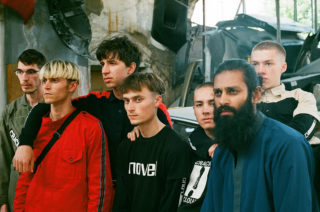Crack Cloud: The Vancouver collective finding recovery in dancing post-punk
Cutting the umbilical chord and emerging from a realm of addiction and darkness
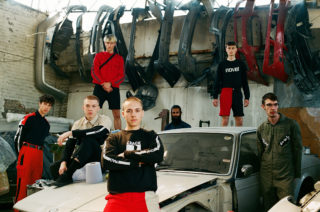
Cutting the umbilical chord and emerging from a realm of addiction and darkness
Vancouver collective Crack Cloud are a many-headed beast. In their present incarnation there are seven of them, playing various strains of guitars, percussion and synths, but you get the feeling that could change with the wind. They could just as soon be a three piece, or a full art-rock orchestra, or just one person on their own with a sample pad.
“It’s very fluid, people come in and out,” notes singer and drummer Zach Choy. “These last few months have really been a means of finding where the collective stands, philosophically, and how to stabilise as a more permanent group of individuals who all resonate with what Crack Cloud is. But the seven of us have all been playing live together for a year now more or less. In and out.”
The ‘in’ today consists of Zach, slight and shorn, in black sequined sliders, sample pad player and vocalist Mohammed Sharar, whose silver nail varnish glints as he talks with his hands, guitarist Jon and bass player Daniel, both of whom seem to have just come along to kill some time. Tonight is the band’s first ever show in London, so we’ve wandered away from the venue to give them a chance to look around and find something to eat. That also means the quietest place for our chat is a typically piss-stained alleyway tucked behind Islington Police Station – hardly an auspicious start, maybe, but they don’t mind settling down in the gutter. Oscar Wilde had a point when he said some of us are looking at the stars.
And Crack Cloud should have their sights set high. Their self-titled debut LP is a reissue of their two bedroom EPs, ‘Crack Cloud’ and ‘Anchoring Point’, but carries the self-assuredness of a band much further down the line. True to its name, ‘Anchoring Point’ in particular is the band finding their centre; a many layered art project that sees Zach hit his mark in danceable post-punk akin to Gang of Four and early Talking Heads.
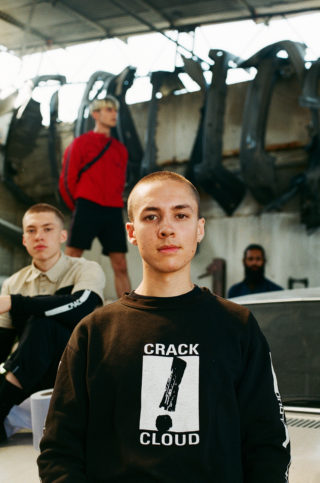
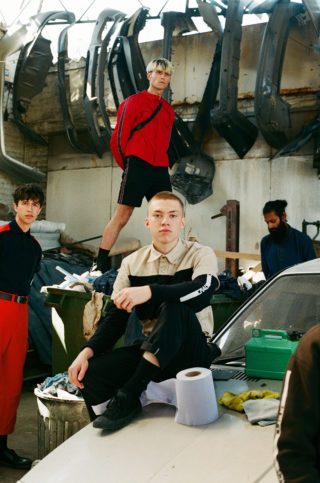
“The first EP was a bit more organic, more live off of the floor – we built it from rhythm sections and then added guitars and structured it,” Zach says. “It’s always been a studio project. It’s been a collage of sorts. ‘Anchoring Point’ was when we really started experimenting with layering and with fleshing everything out piece by piece, one at a time.”
The two EPs were never meant to be a package deal but they were both born out of an emotionally tumultuous time for the band, and together they close the door on an era that Zach and the others are happy to have relegated to the past.
“They definitely represent a chapter in our life that now we can all let go of,” says Zach.
Guitarist Jon Varley, who up until this point has been quietly rolling a cigarette and nodding along, leans around him into the conversation. “It’s definitely a jumping off point stylistically too,” he points out.
Then he ducks back again. Mohammed nods.
“Yeah, and I feel like we never pictured the idea that the second release would fit in to this LP as a whole with the first EP, but it does have a connection and I think it flows well enough,” he says.
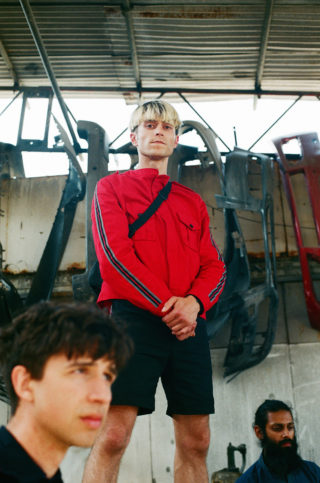
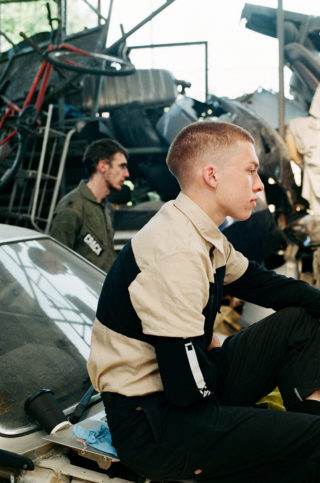
The chapter that the LP encompasses also includes a visual trilogy, made up of dark, surreal music videos for singles ‘Swish Swash’, ‘Image Craft’ and ‘Uncanny Valley’. Watching the black and white clips, it’s easy to get a sense of a mind – or minds – in turmoil, and a feeling of impending doom. The trilogy, Zach says, “was a document of our past five to ten years of struggling with our own mental health and our own addiction, and I feel like after we finished ‘Uncanny Valley’ it felt like the end of an era. We’ve been sober for a few years now so to push that out it felt kind of like cutting the umbilical cord, starting a new chapter and moving forward. Thematically, now I feel like there’s so much more to tackle that’s outside of that realm of addiction and darkness,” he says.
Obviously, the visual trilogy and its themes come from a place of extreme vulnerability – something that Zach struggled with on the early Crack Cloud output. Now, having opened the floodgates, he doesn’t expect to go back into less emotionally raw writing any time soon.
“When we wrote the first EP I was a lot more timid about being vulnerable and I would focus on macroscopic issues that you’ll find in a lot of post-punk,” he says. “‘Anchoring Point’ was definitely a more personal exploration into identity and I think in retrospect that’s where we wanted to be thematically from the very beginning, but it took that first EP to get to ‘Anchoring Point’, to get to that means of expression.” He pauses. “And the next one I think is just going to be deeper into that introspective state of what identity is and what history is and what kind of trajectory people are on and where you can go.”
Crack Cloud seem to run up against questions of identity a lot these days. As they gain momentum and get a wider following, they’re finding out that parts of their story so easily get defined by other people. Take the suggestion that they draw their political ethos from the likes of Malcolm X and Lydia Lunch, for example.
“The interview that we did that now exists in biography form was a very casual interview that we didn’t think would become the definitive biography,” says Zach. “It was a conversation that we had with someone in passing and it’s now archived all over the Internet. Malcolm X fascinates us because of his extremity and his conviction, and Lydia Lunch we’re attracted to for her obscurity and for her audacity. But there are so many thinkers, so many people, so many sights and smells and whatever that we are influenced from – and those two thinkers are the ones that are on the Internet now.”
He shrugs.
“I think, too, that why names like Malcolm X get brought up is because of the type of life and story arc that he has and in essence a life of retribution and giving back to people when he had a really difficult upbringing as well. Just the tragedy of it all, and knowing that everyone is capable of having a larger duty in life,” says Mohammed. “And I think we always felt like this project came out of the means of having nothing and trying to create life.”
For certain members of the band, Crack Cloud functions as a vehicle for recovery. It has to be changeable and immersive, as the focus of the band shifts and expands with their new lives. The work (the recovery) is all consuming.
“We’re building a universe where Crack Cloud exists as one of many entities,” Zach tells me. “I think it’s just going to become more and more uninhibited and ambitious, which you’ll see through our video projects and stuff. It’s going to be many mediums, and I think it’s going to be challenging for a lot of people to digest. Because some of the ideas are challenging for even us to get out.”
“I think, though, that making this art is very healing,” adds Mohammed.
Zach nods. “It’s our rehabilitation outlet. At the end of the day that’s what it is. It’s for us.”
